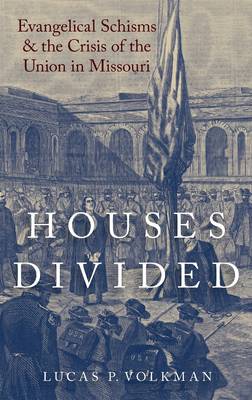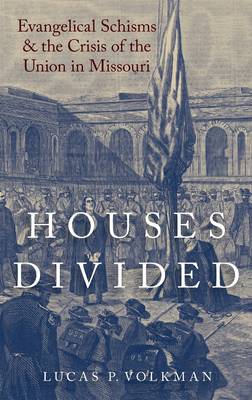
- Afhalen na 1 uur in een winkel met voorraad
- Gratis thuislevering in België vanaf € 30
- Ruim aanbod met 7 miljoen producten
- Afhalen na 1 uur in een winkel met voorraad
- Gratis thuislevering in België vanaf € 30
- Ruim aanbod met 7 miljoen producten
Zoeken
€ 193,45
+ 386 punten
Omschrijving
Houses Divided provides new insights into the significance of the nineteenth-century evangelical schisms that arose initially over the moral question of African American bondage. Volkman examines such fractures in the Baptist, Methodist, and Presbyterian churches of the slaveholding border state of Missouri. He maintains that congregational and local denominational ruptures before, during, and after the Civil War were central to the crisis of the Union in that state from 1837 to 1876. The schisms were interlinked religious, legal, constitutional, and political developments rife with implications for the transformation of evangelicalism and the United States from the late 1830s to the end of Reconstruction. The evangelical disruptions in Missouri were grounded in divergent moral and political understandings of slavery, abolitionism, secession, and disloyalty. Publicly articulated by factional litigation over church property and a combative evangelical print culture, the schisms were complicated by the race, class, and gender dynamics that marked the contending interests of white middle-class women and men, rural church-goers, and African American congregants. These ruptures forged antagonistic northern and southern evangelical worldviews that increased antebellum sectarian strife and violence, energized the notorious guerilla conflict that gripped Missouri through the Civil War, and fueled post-war vigilantism between opponents and proponents of emancipation. The schisms produced the interrelated religious, legal and constitutional controversies that shaped pro-and anti-slavery evangelical contention before 1861, wartime Radical rule, and the rise and fall of Reconstruction.
Specificaties
Betrokkenen
- Auteur(s):
- Uitgeverij:
Inhoud
- Aantal bladzijden:
- 328
- Taal:
- Engels
- Reeks:
Eigenschappen
- Productcode (EAN):
- 9780190248321
- Verschijningsdatum:
- 1/03/2018
- Uitvoering:
- Hardcover
- Formaat:
- Genaaid
- Afmetingen:
- 157 mm x 236 mm
- Gewicht:
- 566 g

Alleen bij Standaard Boekhandel
+ 386 punten op je klantenkaart van Standaard Boekhandel
Beoordelingen
We publiceren alleen reviews die voldoen aan de voorwaarden voor reviews. Bekijk onze voorwaarden voor reviews.











